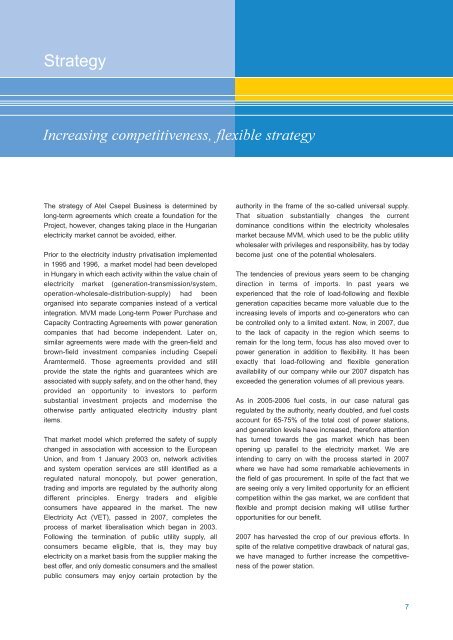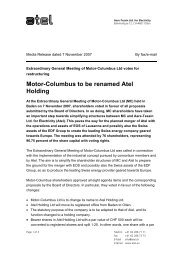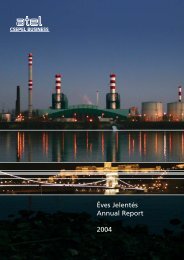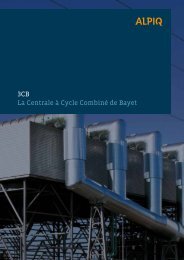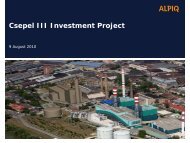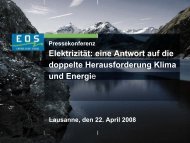Atel Csepeli Vállalatcsoport - Ãves Jelentés 2007 PDF (1.3 MB)
Atel Csepeli Vállalatcsoport - Ãves Jelentés 2007 PDF (1.3 MB)
Atel Csepeli Vállalatcsoport - Ãves Jelentés 2007 PDF (1.3 MB)
You also want an ePaper? Increase the reach of your titles
YUMPU automatically turns print PDFs into web optimized ePapers that Google loves.
StrategyIncreasing competitiveness, flexible strategyThe strategy of <strong>Atel</strong> Csepel Business is determined bylong-term agreements which create a foundation for theProject, however, changes taking place in the Hungarianelectricity market cannot be avoided, either.Prior to the electricity industry privatisation implementedin 1995 and 1996, a market model had been developedin Hungary in which each activity within the value chain ofelectricity market (generation-transmission/system,operation-wholesale-distribution-supply) had beenorganised into separate companies instead of a verticalintegration. MVM made Long-term Power Purchase andCapacity Contracting Agreements with power generationcompanies that had become independent. Later on,similar agreements were made with the green-field andbrown-field investment companies including <strong>Csepeli</strong>Áramtermelõ. Those agreements provided and stillprovide the state the rights and guarantees which areassociated with supply safety, and on the other hand, theyprovided an opportunity to investors to performsubstantial investment projects and modernise theotherwise partly antiquated electricity industry plantitems.That market model which preferred the safety of supplychanged in association with accession to the EuropeanUnion, and from 1 January 2003 on, network activitiesand system operation services are still identified as aregulated natural monopoly, but power generation,trading and imports are regulated by the authority alongdifferent principles. Energy traders and eligibleconsumers have appeared in the market. The newElectricity Act (VET), passed in <strong>2007</strong>, completes theprocess of market liberalisation which began in 2003.Following the termination of public utility supply, allconsumers became eligible, that is, they may buyelectricity on a market basis from the supplier making thebest offer, and only domestic consumers and the smallestpublic consumers may enjoy certain protection by theauthority in the frame of the so-called universal supply.That situation substantially changes the currentdominance conditions within the electricity wholesalesmarket because MVM, which used to be the public utilitywholesaler with privileges and responsibility, has by todaybecome just one of the potential wholesalers.The tendencies of previous years seem to be changingdirection in terms of imports. In past years weexperienced that the role of load-following and flexiblegeneration capacities became more valuable due to theincreasing levels of imports and co-generators who canbe controlled only to a limited extent. Now, in <strong>2007</strong>, dueto the lack of capacity in the region which seems toremain for the long term, focus has also moved over topower generation in addition to flexibility. It has beenexactly that load-following and flexible generationavailability of our company while our <strong>2007</strong> dispatch hasexceeded the generation volumes of all previous years.As in 2005-2006 fuel costs, in our case natural gasregulated by the authority, nearly doubled, and fuel costsaccount for 65-75% of the total cost of power stations,and generation levels have increased, therefore attentionhas turned towards the gas market which has beenopening up parallel to the electricity market. We areintending to carry on with the process started in <strong>2007</strong>where we have had some remarkable achievements inthe field of gas procurement. In spite of the fact that weare seeing only a very limited opportunity for an efficientcompetition within the gas market, we are confident thatflexible and prompt decision making will utilise furtheropportunities for our benefit.<strong>2007</strong> has harvested the crop of our previous efforts. Inspite of the relative competitive drawback of natural gas,we have managed to further increase the competitivenessof the power station.7


